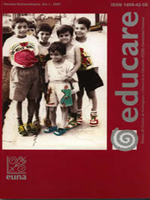La diversidad en el aula, el gran desafío en la actualidad. ¿Están el y la docente preparados para enfrentarlo?
DOI:
https://doi.org/10.15359/ree.1-Ext.2Keywords:
Diversity, multicultural, migrants, multicultural classroom, multicultural education, multicultural curriculum, teachersAbstract
Nowadays, Costa Rican classrooms have become multicultural spaces, characterized by the presence of children from diverse populations, especially because of phenomena such as migrations, but also due to social and economical factors. As a result, diversity within the classroom represents a big challenge for teacher, who are required to educate students with truly dissimilar characteristics while offer them an education in accordance with their specific individual needs. Teaching in the multicultural classroom is a challenge that involves a change of attitude to the “others”. This can only be achieved through the recognition of students as unique and different human beings, people who have a view of the world built through specific life experiences; experiences that have to be taken into account when teaching because this is the basis to succeed or fail as educators. Consequently, it is important to know different approaches that discuss diversity and multiculturalism at the present time, giving us light to find the correct path in order to face this complex reality.
References
Alvarenga, P. (1997). Conflictiva convivencia los nicaragü,enses en Costa Rica.
Cuaderno de Ciencias Sociales 101. San José, Costa Rica: FLACSO.
Álvarez, N. (2002). Multiculuralismo e inmigración: Retos Ideológicos del Siglo
XXI. Cuadernos Electrónicos de Filosofia del Derecho. España: Universidad
de Alcalá. En línea: http: www.uv.es/CEFD/5/alvarez.html
Barberousse, P. (2001). Globalización y Posmodernidad: Desafios al Aprendizaje.
Revista EDUCARE, JI, 9-25.
Barberousse, P. (2003). Buscando respuestas al reto de la diversidad desde la pedagogía
crítica. Revista EDUCARE, IV, 21-30.
Benedetti, M. (1980). Inventario. Poesía 1950-1980. Madrid, España: VISOR Libros.
Besalú, X. (1996). Curríéulum y multiculturalismo en la escuela. Sobre iterculturalitat.
Documents de treball del la cinquena i sisena Escola d'Estuit sobre
interculturalitat i del primer i segon Fórum Intercultural. En línea: http: www.
uv.mx/dei/P _publicaciones/BasesTeoricas/BesaluXavier.htm
Bonilla, V. (2000). Diversidad: Retos para una educación inclusiva. Revista Educare,
JI, 89-96
Brosio, R. (2000). Issues and arguments concerning class, gender, race and other
"identities". Educational Studies (American Educational Studies Association)
, 393-406
Bueno, J. (1998). Controversias en torno a la educación multicultural. Coruña, España:
Universidad de La Coruña, Facultad de CC. de la Educación.
Camacho, D., Mayorga, R., De Ipola, E., Najenson, J., De Riz, L., Nun, J. (1982).
América Latina: Ideología y cultura. San José, Costa Rica: Ediciones
FLACSO.
Campani, G. (1996). La pedagogía intercultural: una perspectiva para el futuro.
Documents de treball del la cinquena i sisena Escola d'Estuit sobre interculturalitat
i del primer i segon Fórum Intercultural. En línea: http:
www.uv.mx/ dei/P formacion/Diversidad 2001 /Besalu.htm
Entwistlet, H. (2000). Educating multicultural citizens: Melting pot or mosaic. International
Journal ofSocial Education 14, 1-15.
Gallego, l. Entrevista a Mikel Azurmendi. El Parche Digital. En línea: http: www.
elparchedigital.compagssociedad _ 2.htm
Gramsci, A. (1975). Los intelectuales y la organización de la cultura. México, Editorial
Juan Pablos.
Gimeno, S. (1988). Poderes Inestables en Educación. Madrid, España: Morata.
Hagiwara, T. (1998). Introduce multiculturalism in your classroom. Intervention in
school and Clinic 34, 43-44.
López, M. (s.f.). La educación intercultural: la diferencia como valor. En línea:
http: www.sauce.cnice.mecd.es/smarti4/1opezm.htm
Martín, M. (2002). El velo y la escuela. Revista de Prensa: El País. En línea: http:
www.pangea.org/ariadna/velo-esc-GemaMartin.htm
Meléndez, L. (2002). Atención a la diversidad personal y cultural en el escenario
educativo centroamericano. Ciclo de Conferencias - 2002. Centro Nacional
de Recursos para la Inclusión Educativa. 11 de noviembre de 2002.
Pérez, A. (1998). La cultura escolar en la spciedad neo/ibera/. Madrid, España:
Ediciones Morata, S.L.
Tan, G. (2002). The need for multiculturalism in the classroom as perceived by
Mexican American schoolchildren. United States of America. Multicultural
Education 9, 21-24.
Published
How to Cite
Issue
Section
License
1. In case the submitted paper is accepted for publication, the author(s) FREELY, COSTLESS, EXCLUSIVELY AND FOR AN INDEFINITE TERM transfer copyrights and patrimonial rights to Universidad Nacional (UNA, Costa Rica). For more details check the Originality Statement and Copyright Transfer Agreement
2. REUTILIZATION RIGHTS: UNA authorizes authors to use, for any purpose (among them selfarchiving or autoarchiving) and to publish in the Internet in any electronic site, the paper´'s final version, both approved and published (post print), as long as it is done with a non commercial purpose, does not generate derivates without previous consentment and recognizes both publisher's name and authorship.
3. The submission and possible publication of the paper in the Educare Electronic Journal is ruled by the Journal’s editorial policies, the institutional rules of Universidad Nacional and the laws of the Republic of Costa Rica. Additionally, any possible difference of opinion or future dispute shall be settled in accordance with the mechanisms of Alternative Dispute Resolution and the Costa Rican Jurisdiction.
4. In all cases, it is understood that the opinions issued are those of the authors and do not necessarily reflect the position and opinion of Educare, CIDE or Universidad Nacional, Costa Rica. It is also understood that, in the exercise of academic freedom, the authors have carried out a rogorous scientific-academic process of research, reflection and argumentation thar lays within the thematic scope of interest of the Journal.
5. The papers published by Educare Electronic Journal use a Creative Commons License:














 The articles published by Educare Electronic Journal can be shared with a Creative Commons License:
The articles published by Educare Electronic Journal can be shared with a Creative Commons License: 



